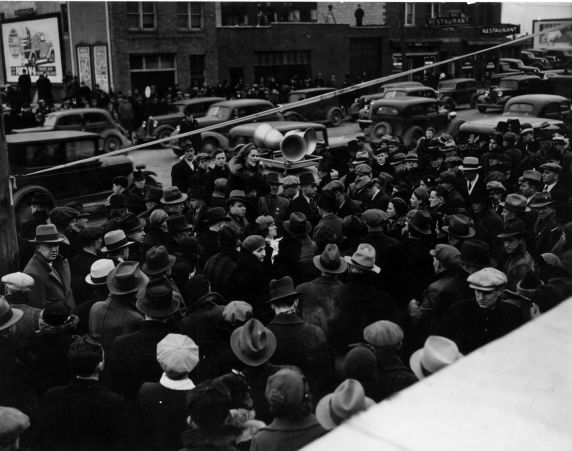Collection Spotlight: Rose Pesotta
This Women’s History Month, we bring you the story of an activist and labor leader whose fascinating life needs to be remembered and re-appreciated. For several decades, Rose Pesotta organized across the country for garment workers in New York, rubber and auto workers in the Midwest, and immigrant laborers in California. She also worked for victims of government persecution, war and prejudice. Pesotta was a pioneer in labor organizing, an unstoppable force for the common worker, for the immigrant and for justice.
Born in 1896 in the Pale of Settlement, the large region of Czarist Russia that served as a Jewish ghetto, Rose Pesotta (originally Peisoty) had little formal schooling, but was very influenced by the underground anarchist movement of the times. She joined her sister in New York City in 1913 and immediately began working in and organizing in the garment trade, working her way up from early roles in the ILGWU education department to becoming a key organizer. Pesotta attended the Brookwood Labor College in the 1920s, which consolidated her skills and union spirit. She spearheaded picketing and sit-downs strikes for the Dressmakers General Strike in Los Angeles in 1933 and was awarded with election as vice-president of the ILGWU in 1934. She went on to organize for several labor upheavals in the rubber industry in Ohio in the 1930s.
Her successes led union organizers to send Pesotta in 1936 and 1937 to Montreal, to organize thousands of dressmakers, and to Detroit, where autoworkers were organizing. She played an important role in the 1937 sit-down strike at the Fisher Body Works in Flint, Michigan, sharing the podium and bullhorn with Walter, Roy and Victor Reuther and many others in keeping up the morale of the strikers. She went from building to building, aiding the occupying workers inside with food, clothing, supplies and moral support. At one point thugs beat her, causing a permanent hearing injury. At times she worked with the Women’s Emergency Brigade, a support group of strikers’ family members. Pesotta’s name was included in a warrant for the arrest of activists, including Roy Reuther.
Through the rest of the 1930s and 1940s, Pesotta continued organizing across the country, working extensively with the ILGWU in California, and served on the General Executive Board of the CIO. She chafed at the limitations on women’s roles in the union and eventually resigned from her CIO post in 1944, stating that, “One woman vice-president could not adequately represent the women who now make up 85 percent of the International’s membership.”
After World War II, Pesotta’s work continued in support of war refugees, traveling to Europe to observe their circumstances. In her many reports, articles and memoirs, Pesotta recorded the plight and needs of many immigrant workers, including Italians, Chinese, Latinos and particularly women workers. Her background beliefs in anarchism and personal freedom created conflict with more conservative labor leaders and with the U.S. government. In later life, she returned to work in the factory and wrote two books of memoirs, Bread Upon the Waters (1944) and Days of Our Lives (1958). Rose Pesotta died in 1965.
In addition to photos of Pesotta with Roy Reuther at the 1937 Flint strike, several Reuther Library collections contain material by or about Pesotta. She is noted as an important correspondent in the Henry Kraus Papers. The Dorothy Kraus Papers include first-hand accounts of many of the union activities in which Pesotta, Kraus and other women participated, particularly the 1937 Flint strike. The John Beffel Papers contain correspondence, notes and manuscript material for Pesotta’s books and articles, for which Beffel served as a collaborator and editor. The Brookwood Labor College Records also reside at the Reuther Library. Among other relevant collections are the papers of Walter Reuther, Roy Reuther and Victor Reuther, Genora Dollinger, the Flint Labor Collection, as well as the papers and oral histories of many women in the labor movement during the same years as Rose Pesotta.


 Reddit
Reddit Facebook
Facebook LinkedIn
LinkedIn